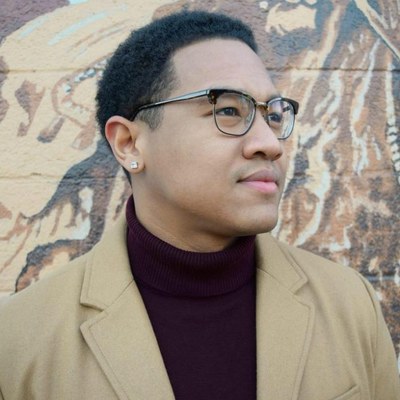SPHIS Home » News » Public health student discusses unique research program, epidemiology interests
Public health student discusses unique research program, epidemiology interests

Delvon Mattingly completes his master’s degree in epidemiology at the end of the summer. He was one of the first graduates of the School of Public Health and Information Sciences bachelor’s degree program. An opportunity to take part in the Cancer Education Program (CEP) during the summer of 2016 opened him to new research possibilities. UofL News spoke with Mattingly about that experience and his future plans.
UofL News: How has the CEP program contributed to your goals?
Delvon Mattingly: One of my long-term goals is to obtain a PhD and continue improving public health via research and advocacy. The CEP represented one of my first experiences conducting a real secondary data analysis with the help of brilliant mentors. Prior to enrolling in the CEP, I had limited introductory knowledge of public health and epidemiology through my undergraduate coursework. I graduated with a BS in Public Health from UofL a few weeks before the CEP began. This program exposed me not only to the world of epidemiological research, but also cancer research. The experience helped alleviate my doubts about pursing a graduate degree in a heavily research-oriented discipline.
UofL News: Who was your mentor in the CEP program?
Delvon Mattingly: My CEP mentor was Dr. Richard Baumgartner. I also worked with Dr. Kathy Baumgartner and Dr. Stephanie Boone in the Department of Epidemiology and Population Health at the School of Public Health and Information Sciences. I also would like to acknowledge Dr. Rachel Neal in the Department of Environmental and Occupational Health Sciences, who informed me about the program and encouraged me to apply.
UofL News: When did you decide to pursue the health sciences?
Delvon Mattingly: I’ve always wanted to pursue a career in a health-related discipline. I grew up witnessing my family, close friends and members of my communities struggle with chronic illness, on top of dealing with socioeconomic disadvantages. I played the aspiring doctor role until I discovered public health, which I didn’t know much about at the time.
I often refer to my introduction to public health as serendipitous. The year I moved back to Louisville from attending Western Kentucky University was the same year UofL launched an undergraduate public health program. I decided to give the program a shot, and transferred from WKU to UofL. As it turned out, I fell in love with public health. I was among the program’s first graduating class, and I learned a lot from UofL’s incredible faculty.
I expect to complete a MS degree in epidemiology at the end of this summer. I’ll defend my thesis sometime in the next couple of months.
UofL News: What’s next?
Delvon Mattingly: I’m attending the University of Michigan this fall for a PhD in Epidemiology. I will conduct research at the Center for Social Epidemiology and Population Health with Dr. Nancy Fleischer as my primary mentor. My research interests focus on social determinants of health and health disparities in vulnerable populations, both in the United States and globally.
I want to conduct research that integrates a multi-faceted approach to understanding health inequalities in populations including racial/ethnic minority groups and the LGBTQ community. The hope is to promote efforts and advocacy toward eliminating these disparities and improving overall population health.
I also have an interest in life course epidemiology, cancer epidemiology and the epidemiology of substance use — including tobacco use. At the moment, I work with the American Heart Association Tobacco Regulatory and Addiction Center (A-TRAC) and Green Heart Louisville.
UofL News: What advice would you give to someone considering UofL’s Cancer Education Program?
Delvon Mattingly: I would tell them the CEP is a fulfilling experience and to take advantage of networking opportunities with the many mentors and peers with similar research interests. Although I went into the program with no background in cancer research experience, it is a great way to get your foot in the door. Every participating student works on a variety of cancer-related research projects with different mentors. It was fascinating to see my peers’ completed research projects at the undergraduate symposium and Research!Louisville events.






